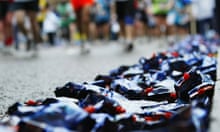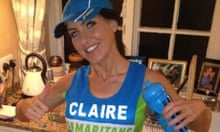Claire Squires, the 30-year-old woman who died while running the London marathon last year, had a now-banned stimulant, Jack3d, in her water bottle.
"Claire was always in the gym and this stuff was being widely talked about there," said Simon van Herrewege, her boyfriend of three years.
Speaking at Squires's inquest in Southwark, south London, on Wednesday, he added: "She took it a couple of times [while training for the marathon] but didn't really get on with it. She never particularly liked it but wanted to beat her previous marathon time [of just over four hours].
"She said she was going to take one scoop, as recommended. In her own words: 'If I hit a bit of a wall, I might take this drink and see if it pushes me through the end of the marathon,'" he added.
Van Herrewege said Squires had gone online to buy the energy drink, said to boost energy, concentration and metabolism. Jack3d was banned in August last year, four months after Squires's death, after concerns over a stimulant called DMAA (dimethylamylamine) found in the powder. DMAA has been linked to high blood pressure, headaches, vomiting, stroke and a death.
Last year, the UK's medicines watchdog, the Medicines and Healthcare products Regulatory Agency, ruled DMAA was unlicensed and that all products containing the stimulant must be removed from the market to protect public safety.
Similar rulings have been made around the world, including in the US and Australia, where a man died after buying DMAA online.
It is not known if Squires drank the water containing the powder after 15 miles, as van Herrewege said she had been planning, but he testified that Squires, a hairdresser, was carrying the bottle containing the powder as she set off on the race.
The inquest also heard that although Stephanie Curnoe, Squires's acupuncturist, has said she identified an irregular heartbeat in the runner in 2011, the hairdresser had not mentioned that either to her family, boyfriend or doctor.
"Claire knew what she was doing," said Van Herrewege. "She was a very healthy girl. If anything was wrong with her, she would go and see a doctor. She was always very open with me and her family if anything was wrong with her, but didn't say anything about the acupuncturist's saying she had a irregular heartbeat."
In a statement read out to the inquest, Squires's GP, Dr H Delargy, said she "didn't consult with me as regarding an irregular heartbeat".
In a statement read out to the inquest, Squires's father, Paul, said his daughter had experienced two convulsions when she was three and five.
Nicola Drake, a senior consultant specialising in cardiac arrests, who was at St Thomas's emergency department the day Squires was bought in, told the inquest: "DMAA is a form of stimulant similar to amphetamines. I imagine that would cause a raising of the heart rate, increased adrenaline and making the heart work harder. I have seen it associated with deaths in America among soldiers who have undergone extreme exercise."
Taking the amphetamine-like substance, she added, "is not something I could recommend", especially, she said, when undergoing extreme exercise.
Dr Sanjay Sharma, professor of cardiology at St George's hospital and the medical director of the London marathon, was on the scene when Squires collapsed.
He said there was an unusual amount of blood in Squires's lungs and that could be the "possible impact of a supplement she had inadvertently taken".
"This may have particularly contributed to, and directly caused, the excess amounts of blood in the lungs," he added.
Sharma said that while the London marathon does not currently issue information to competitors about the danger of taking energy supplements, "we will be changing that, dependent on the outcome of this inquest".
In a statement read at the inquest, Curnoe said that when Squires attended her clinic for an initial consultation on 12 October 2011, she detected an irregular pulse before Squires's treatment. The rhythm, she added, had returned to normal after the treatment.
"An irregular pulse merits a referral to a traditional doctor for consultation," she said in her statement. "I alerted Claire to the fact that I had noticed this and that it warranted further treatment with her GP. I advised her to make an appointment."
Prof William McKenna of the University College London hospitals trust, who reviewed Squires's medical records, said he found "significant levels" of the amphetamine-like substance in her blood. The energy drink was, he added, "an important factor" in Squires's death.
"In an apparently fit and healthy young woman who dies suddenly in the last stages of the London marathon, with no abnormalities identified to explain her death, the toxicology identifying an amphetamine-like substance does suggest its contribution to her [cardiac] arrest, particularly after excessive exercise," he said.
"In the absence of further evidence, we think the irregular heartbeat is a red herring and the substance found in the blood is an important factor in the outcome."
The hearing continues.







